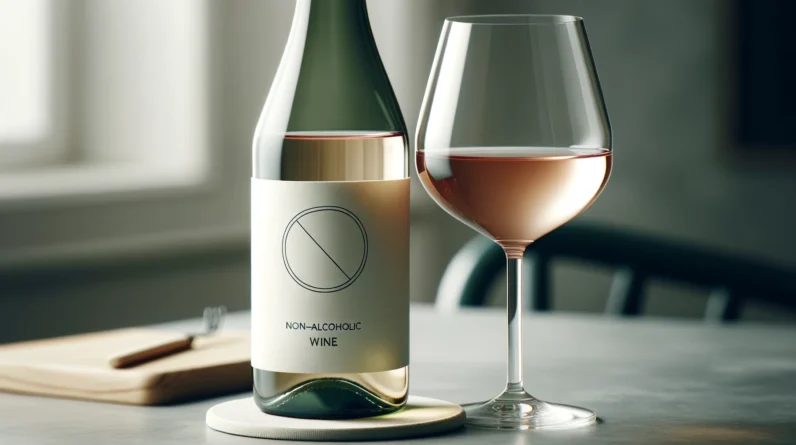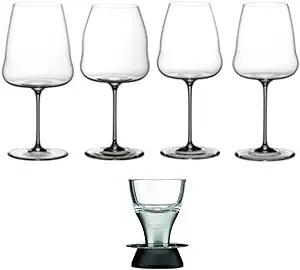
Diving into the world of red wines, we find there’s more to enjoy than just flavor—there are health benefits too.
In this exploration, we’ll focus on which red wines are the top picks for health-conscious drinkers.
From wines packed with antioxidants to those with less alcohol, there’s a variety for everyone who wants to sip smartly.
Scientific Research
Scientific research and expert opinions have highlighted various health benefits associated with specific red wine grapes, primarily due to their polyphenolic compounds, such as resveratrol and
proanthocyanidins.
Glucose Levels and Diabetes
A study by Da Luz et al. focused on the health benefits of moderate red wine consumption concerning glucose levels and diabetes.
The results indicated that regular red wine drinkers, particularly those around 60 years old, have lower glucose levels and a lower occurrence of diabetes compared to those who abstain from
alcohol.
Cardiovascular Health
Red wine intake has been related to a reduced risk for coronary heart disease (CHD).
This connection is supported by a wealth of scientific literature, including experimental studies and meta-analyses, which have found benefits from moderate alcohol consumption.
Resveratrol and Heart Health
Resveratrol, found in red wine, might aid in preventing damage to blood vessels, lowering LDL cholesterol (often referred to as “bad” cholesterol), and preventing blood clots.
Although research on resveratrol has produced mixed results, some studies suggest that it could be linked to a lower risk of swelling and inflammation.
Additionally, wines and grapes may attenuate cardiac diseases such as atherosclerosis and ischemic heart disease.
Resveratrol and proanthocyanidins, especially found in grapes and wines, are thought to play a significant role in the cardioprotective abilities of these beverages.
Antioxidants in Grapes and Wine
The antioxidants in grapes, grape juice, and wine, such as flavonoids and polyphenols, can help the cardiovascular system by relaxing blood vessels.
While there is a consensus on the benefits of polyphenols from fruits and vegetables, the benefits of wine, and by extension the grapes from which they are made, are still being debated and
researched.
The key takeaway from these studies is that moderate consumption of red wine, which contains these beneficial compounds, may contribute to certain health benefits, especially concerning
cardiovascular health.

Best Red Wine Grapes for Health
Red wine grape varieties vary in their nutritional content and associated health benefits.
Here’s a synthesis of detailed information from different sources on the healthiest red wine grape varieties based on their antioxidants and related health benefits.
Pinot Noir
According to sommeliers consulted by The Daily Meal, Pinot Noir has the highest concentration of the antioxidant resveratrol among red wines.
Resveratrol has been linked to a multitude of health benefits, including lower risks of cancer, stroke, and heart disease.
Pinot Noir also typically has lower initial sugar levels before fermentation, which results in less alcohol and fewer calories post-fermentation.
Additionally, with its thin skin, Pinot Noir has fewer tannins which can be better for those susceptible to heartburn.
Dark Red Wines
Generally, dark red wines are known for having high antioxidant levels.
This is because the antioxidants are found in the pips and skins of grapes and are more prevalent in full-bodied red wines that have had contact with oak.
If a red wine is so dark that you cannot see through it, it likely contains a high amount of polyphenols, which are beneficial to health.
Other Red Grapes
In a study reported by Hindawi, a comparative analysis focused on the antioxidant contents of different red wine grape varieties, particularly Sangiovese, Canaiolo, and Colorino.
The analysis revealed that the total polyphenols content in untreated wine samples was as high as 3334 ± 60 mg (gallic acid)/L on average.
High contents of quercetin and quercetin glucoside were found in Sangiovese/Canaiolo/Colorino wine, with concentrations of 21 ± 2 and 3.0 ± 0.2 mg/L, respectively.
Sangiovese wines, in particular, showed high concentrations of resveratrol, ranging from 1.3 ± 0.1 mg/L in the 2015 harvest to 2.6 ± 0.3 mg/L in the 2010 harvest.
These findings highlight the significant levels of health-related compounds present in these grape varieties, which are beneficial due to their antioxidant properties.
Moderate Drinking Benefits
Across various studies, it has been found that moderate wine drinkers have a 34% lower mortality rate than those who consume beer or spirits.
Moreover, moderate drinkers have a 30% lower risk of developing type 2 diabetes and experience a slower decline in brain function compared to non-drinkers.
These insights provide a clearer picture of which red wine grape varieties might offer the most significant health benefits.
However, it’s important to note that the key to these benefits is moderate consumption, as excessive alcohol intake negates the positive effects and can lead to serious health issues.

Recommendations:
For health-conscious individuals looking to enjoy red wine, here are some recommendations that may align with dietary choices or lifestyle changes.
Pinot Noir
This wine has a high concentration of resveratrol, an antioxidant linked to heart health, lower risks of cancer, stroke, and heart disease.
It also tends to have lower sugar levels prior to fermentation and fewer calories in the final product.
Sangiovese, Canaiolo, and Colorino
These Italian grape varieties are rich in polyphenols, including quercetin and resveratrol, which are antioxidants beneficial for cardiovascular health.
They are often used in Chianti and other Tuscan wines.
Dry Red Wines
Varieties such as Cabernet Sauvignon, Merlot, and Syrah are known to be dry, meaning they have minimal residual sugar.
This can be beneficial for those looking to reduce sugar intake for dietary reasons.
Organic Red Wines
These are made from grapes grown without synthetic pesticides or fertilizers and tend to have lower sulfite levels.
Some studies suggest that organic fruits may have higher antioxidant levels.
Low-Alcohol Red Wines
Wines with a lower alcohol content generally contain fewer calories.
They can be a part of a healthier lifestyle and might reduce the likelihood of alcohol-related health issues.
In all cases, the benefits of red wine are most pronounced when consumed in moderation—typically defined as one glass per day for women and up to two for men.
Additionally, health benefits can be negated by drinking more than the recommended amount, and it’s important to remember that non-alcoholic red wine extracts are also available for those who
avoid alcohol completely.
Wrapping up, for those who prioritize health without wanting to give up on red wine, choices abound.
Pinot Noir stands out for its rich antioxidants, while Sangiovese shines in heart health benefits.
And if you’re watching your sugar or alcohol intake, dry, organic, or low-alcohol wines are your go-to options.
Remember, the secret is moderation—this way, you can enjoy the best of both worlds: health benefits and the delight of wine.
FAQs:
Q1: What red wine has the most health benefits?
A1: Pinot Noir is often cited for its high resveratrol content, an antioxidant that supports heart health.
Q2: Can red wine fit into a health-conscious diet?
A2: Yes, especially if you choose dry red wines with lower sugar content or organic wines with fewer additives.
Q3: Are there red wines with lower alcohol content?
A3: Yes, look for wines labeled as low-alcohol, which typically have an alcohol content less than 12.5%.
Q4: How does moderate red wine drinking affect health?
A4: Moderate red wine consumption is linked to a lower risk of heart disease and type 2 diabetes, and a slower decline in brain function.
Q5: Can red wine help with longevity?
A5: Some studies suggest that compounds in red wine like resveratrol can promote a longer lifespan by activating certain genes related to longevity.
Q6: Is organic red wine better for you?
A6: Organic red wine is made without synthetic pesticides and may have higher antioxidant levels, making it a preferable choice for some health-conscious drinkers.
Q7: What are the best red wine choices for someone with a heart condition?
A7: Wines rich in antioxidants like resveratrol, such as Pinot Noir and Sangiovese, are often recommended, but always consult with a healthcare provider first.







